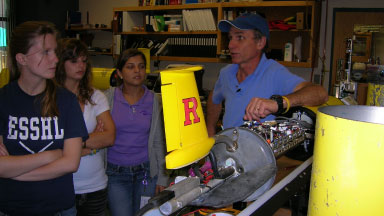|
|||
Scott's lab provides tools and technologies used in process studies that range in size from individual Principal Investigators to multi-institutional science campaigns; real-time and historical data sets and numerical forecasts supporting a wide variety of scientific and applied users; and a local test bed for new technologies. Additional research interests include sediment and storms, and maritime security.
Regionally, he is the lead Principal Investigator on the Mid-Atlantic Regional Association for Coastal Ocean Observing Systems (MARACOOS), a partnership of universities, private companies, non-governmental institutions and state/federal government agencies that coordinates and facilitates observations of the ocean and estuaries between Cape Hatteras and Cape Cod.
Fieldwork is conducted by Scott's lab across the globe, including the Arctic and Antarctica, Europe and the Caribbean, places that have good models but are data poor. The next step is to move to less developed countries, ones that don't have oceanographic institutions. “Less developed nations will be most affected by the changing climate, and the ocean is a critical piece,” says Scott. “We have the technologies, now we have to bring them to countries that need them and help them as best we can. The models are global, they go anywhere in the world, all we need is to assimilate the data.”
Scott's Research
- Ocean Observing, including projects relating to the Hudson Plume, Homeland Security, Deepwater Horizon oil spill, and MARCOOS
- Gliders, including a guided tour of a Slocum glider


